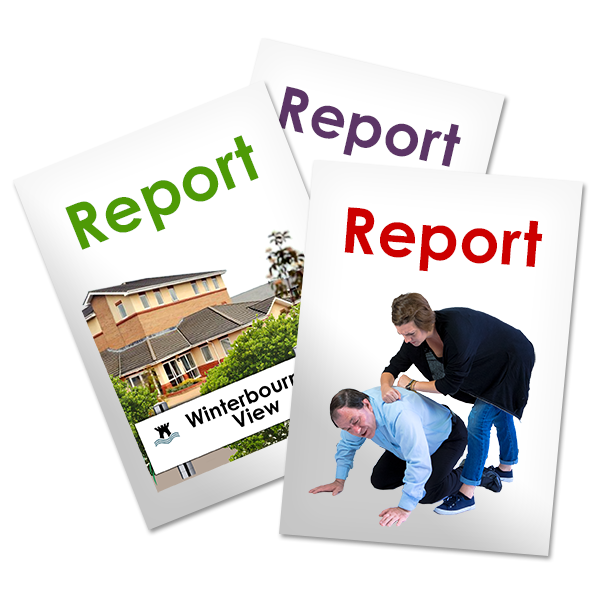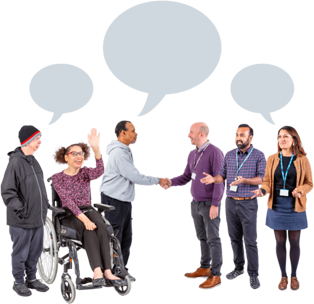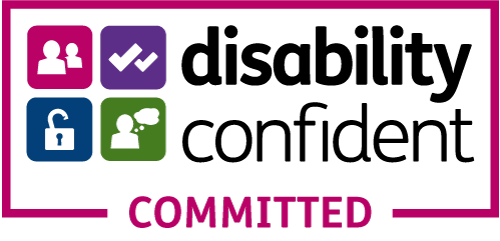Our approach to supporting disabled survivors
We work at the client’s pace and in a way that works for them. We accept disabled people for who they are, and do not make assumptions about their impairments and capabilities.
We believe our clients and listen- often this is the first time they have been believed. Most of all, we ‘hold’ clients emotionally for as long as they need us.
We accept and welcome client’s impairments and differences; we help them develop a positive self-image and confidence as disabled people and to take control.
The social model of disability underpins all our work; the focus is on removing barriers and addressing discrimination rather than seeing the client’s impairment as the problem. Stay Safe East works to a feminist, intersectional approach and provides services specifically for disabled women. We address client’s cultural, faith and other needs, and provide an inclusive service to LGBTQ+ disabled people.
Our service is holistic, covering all areas of need from initial support around keeping safe, ensuring that action is taken by statutory services, obtaining non-molestation orders or Sanctuary measures, help with addressing barriers to attending court, as well as help with obtaining not only benefits and housing but disability specific services such as care packages, equipment or mental health support. Our support will last from 6 months to 2 years, and sometimes longer.
We meet access, communication and support needs. Supporting disabled survivors is about more than offering the basic building blocks such as a wheelchair accessible space to meet a client, or access via SMS text. Much of our work is about how we work with clients, using a range of tools to help survivors understand their experiences (pictures, DVDs, discussion etc.), and most of all being flexible – for example not closing a client’s case if they fail to turn up for appointments. We understand most people’s impairments and how they have been treated because we ourselves are disabled people who have also faced barriers.
Advocacy
We provide advocacy and support to disabled people that are experiencing any sort of abuse, harassment or violence.
We support disabled people in Waltham Forest, Newham, and sometimes in other East London boroughs.
We provide advocacy and support for victims and survivors in dealing with the police, courts, housing, social services and other agencies.
Support when appriaching the police or going to court
We also provide peer support through our Women’s Group.
Since 2010, Stay Safe / Stay Safe East has supported over 200 disabled people – providing a listening ear, helping people report incidents of abuse to the police, social services, transport or housing providers. We also support our users through court cases, and help them access benefits or get re-housed after domestic violence or hate crime.
What does an advocate do?
If you have been the victim of bullying or abuse, it can feel as if you have no control over your life. Our advocates will support you to make choices. We will help you take control again.
Stay Safe East advocates work in partnership with you. We will tell you about the choices you have. We will help you work out a plan to keep you as safe as possible. We will speak out for you if you want us to, or help you speak out for yourself. We are there for you when you need us for as long as you need us.
How we will support you
We listen to your story. We give you time to tell us what happened. It might be the first time you have told someone, or you might have told many people but nothing has happened. Most of our staff and volunteers are disabled people, and we understand how difficult it can be to speak out about abuse or bullying.
We make sure your access or communication needs are met: We can explain things in easy words, or we can provide a BSL (British Sign Language) or spoken language interpreter when you meet with us. We will make sure that other agencies working with you meet these needs too. We agree a plan with you to keep you safe, and what actions you want us to help you with – for example help to tell the police, or to find a safe place to live.
We put together the evidence that is needed, for example for the police to take action, or for you to get an injunction to stop the person who is harassing you. We work with the police to make sure they record and investigate the crime. If it is a hate crime, we can report it to the police without giving your name, so they know there is a problem in that area.
We come to meetings with you and help you speak for yourself, or speak out for you if you are not ready to do that. We can help you to access other support services: counselling, support groups, college etc
We work to help you get a care package, benefits, transport etc. Because we are a disabled people’s organisation that knows about local services, we can advise you about your rights to services and help you negotiate the system.
If we can’t help on a particular issue, we will do our best to find someone who can!
Who can we help
We help disabled or Deaf victims and survivors of abuse. This could be:
-hate crime
-bullying, harassment and anti-social behaviour
-domestic violence (abuse by your partner or family members)
-abuse by carers in your own home or in residential care
-sexual abuse and rape
-we sometimes also help disabled people report other crimes to the police or to their landlord.
If you are not feeling safe, get in touch with us and we will help.
We can support you if the abuse or harassment is happening now and you want something done about it. We can also support you if it happened a long time ago.
Where We Work
We can help you if you live in:
Waltham Forest, Newham, Enfield, Havering, Barking and Dagenham, Southwark, and many other boroughs. If yours is not listed here, please get in contact and we will let you know if we can support you. If we can’t, we will help you find an organisation near you that can help you.
Disabled People
We will help anyone who has been abused and is a disabled person or has a long-term health condition. This means:
-people who are physically disabled
-blind or partially sighted people
-deaf and hard of hearing people
-people with learning difficulties
-people with neurological impairments such as dyslexia or Asperger’s Syndrome
-people with mental health issues
-people with long term health conditions like sickle cell anaemia, HIV or diabetes for example.
Deaf People
We support deaf people who are BSL users, including Deaf people with learning disabilities. We are not a Deaf-led organisation, but we do understand deaf culture and the Deaf community. We will provide an interpreter (BSL or Deaf-Blind). We will support you when dealing with the police and other organisations. We will try to make sure that your needs as a deaf person are met and that your culture is respected.
If you are a Deaf woman and you are a victim of domestic violence, you can also contact Deaf Hope, a deaf women’s domestic violence project run by Deaf women.
Disabled Women
We recognise that women are at least 5 times more likely to experience domestic abuse than men and that domestic violence is a gender issue.
We offer a women-only advocacy service to any woman who chooses this. Our women’s group is there for support, friendship and social activities.
We work with disabled mothers and with mothers of disabled children, if they have experienced domestic abuse.
Disabled Men
We recognise that disabled men are more likely than non-disabled men to experience domestic abuse, so we offer advocacy and support to disabled men. You can choose to have the support of a male advocate if you prefer.
Lesbians, Gay Men and Transgender People
We are an LGBT (Lesbians, Gay Bisexual Transgender) friendly organisation. Some of our staff and volunteers are lesbian or gay. We understand LGBT cultures. We can support you to report homophobic abuse or hate crime or domestic violence from same sex partners or family members. We also understand the barriers faced by Deaf and disabled LGBT people accessing LGBT organisations.
BME (Black & Minority Ethnic) Communities
We work with disabled people from all communities in East London.
We have a diverse staff and volunteer group.
We support disabled people from BME communities to report racist, faith or homophobic hate crime as well as disability hate crime.
We respect your culture, faith and life choices.
Sometimes we work with another organisation to support disabled women or men who are for example victims of forced marriage or disabled women who are victims of Female Genital Mutilation.
If English is not your first language, our staff and volunteers speak Turkish, Bengali and French. We can provide language interpreters where needed.
Disabled Parents
We know how difficult it can be to leave a violent relationship if you are a disabled parent. You might be worried about your children being taken away if you tell anyone about the abuse. Contact Stay Safe East if you need help.
If you have been a victim of domestic violence and involved in Child in Need / Child Protection proceedings or your child is in care we may be able to help.
Parents and Families of Disabled Children and Adults
We may be able to support you if you are the parent of a disabled child and a victim or survivor of domestic violence. Please contact us for more information. We will support families of disabled people. However, our priority will always be to work with the disabled person directly.
We may be able to support you if you are a carer and want to report abuse against a disabled person who cannot speak out for themselves. If we cannot help, we will refer you to an organisation that can help.
Who We Can’t Help
Sorry, we can’t work with you if you are not disabled (except for parents or families of disabled people, please see above). You can contact other agencies who will support you. Please see Contacts on this website.
Perpetrators of Abuse
Stay Safe East does NOT work with disabled people who are abusers or perpetrators of domestic violence, hate crime or other forms of abuse.
If you are abusing someone and want to stop, please contact:
Respect Phoneline – 0808 802 4040 (phone and text relay) open Monday – Friday 9am-5pm
Email: info@respectphoneline.org.uk
Confidentiality
If you tell us personal information, we will keep it confidential.
If you are being harassed or bullied, we can report what happened without giving your name.
If you are a victim of domestic violence, we will keep the information you tell us confidential. We will never talk to your abuser. We will not tell other family members unless you want us to.
A history of Stay Safe East
Stay Safe East (formerly the Stay Safe Project) was set up in early 2010 by Disability Action Waltham Forest, a user-led organisation: Disability Action set up the Stay Safe project in response to its members and users telling them that they were experiencing hate crime, bullying and harassment, particularly on public transport, in the street, in schools and against people living in supported housing: Many of their members had experienced practical barriers when reporting incidents and getting help and support.
Waltham Forest and Newham has a successful record of tackling racist and homophobic hate crime and generic domestic violence. We want to see this extended to crimes against disabled people, so we decided to set up a project that would support disabled victims and survivors. To do this work well, we have dedicated advocacy staff. We also promote good practice to other organisations – for example the police, housing providers, domestic and sexual violence charities and organisations working with disabled people.
With the help of funding from the Equality and Human Rights Commission, the Stay Safe project was launched in the spring of 2010. At first we worked only in Waltham Forest, but we started to get requests for help from disabled people and from professionals in neighbouring boroughs, mainly in Newham and Redbridge. We gradually became accepted as a source of expertise by social workers, domestic violence practitioners and housing officers. We also joined key working groups in Waltham Forest to try and help disabled people who had experienced hate crime and domestic violence.
In 2011, we moved from Walthamstow to our current office at Crownfield Road, Leytonstone. This is a fully accessible building which we share with several other organisations providing support to disabled people, enabling us to work closely with them. The building is very convenient for accessible public transport.
In 2013, we became Stay Safe East, an Independent Charitable Incorporated Organisation. The Trust for London showed their confidence in us by transferring their funding to our new organisation (Stay Safe East). We were also able to continue with our advocacy work thanks to a small grant from the Walthamstow and Chingford Almhouses, and the committed support of our wonderful volunteers.





